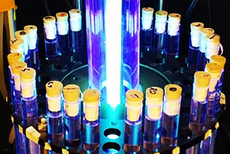Mother diagnosed with stage three cancer after breast ‘changed shape overnight’
Angela Butterworth, 42, from Witney in Oxfordshire, was diagnosed with stage 3 breast cancer in March 2020 during the Covid pandemic
A publisher who was diagnosed with breast cancer on her 15th wedding anniversary and “nearly died” after getting sepsis during chemotherapy said hope and the support from her family and friends kept her going.
Angela Butterworth, 42, said “it was more about surviving than anything else”, but there were days when she questioned whether she had a future, as she was at “death’s door” and felt “absolutely battered” from treatment.
The mother-of-two, who lives in Witney, Oxfordshire, was diagnosed with stage 3 breast cancer on March 20, 2020, amid the coronavirus pandemic after discovering overnight that her right breast had suddenly changed shape and was more firm on one side.
Angela was told that she would most likely need to undergo a mastectomy to remove the tumour, as well as chemotherapy and radiotherapy, but a wait of up to four months for treatment was possible as hospitals were overwhelmed with patients who had coronavirus.
“I don’t know if I was in shock, but I didn’t cry at all (when I was diagnosed),” Angela said. “It was just, okay, this is happening, and we have to try and get the treatment.”
Angela said the news of her diagnosis on her anniversary did not sink in until much later on, and her first thoughts were with her two children, Annabelle and Sophia, who were 11 and eight at the time respectively.
She was given a booklet at the hospital, which offered advice on how to tell her children, and she read this in the car on the way home with her husband, Craig, 48, who is a mortgage adviser.
Angela said: “I couldn’t say it in the end, so my husband told them.
“We sat them down and he said, you know, ‘mummy is very poorly. She is going to have to go through a lot of treatment, (and) she will lose her hair… but the good news is, they are going to treat mummy and we will get through this’.
“My younger daughter cried; my older one sort of stared into space for a while and then cried, so it was a bit horrible really, but we had to tell them what was going on.”
In the days that followed, Angela tried to process her diagnosis and the prospect that her treatment may be delayed, which she described as a “double whammy”.
She feared that, if she had to wait for too long, “it may be too late”.
She was given Zoladex injections – a hormone treatment aimed at preventing the cancer from growing or spreading further – while she waited for an update.
But days later, she was told she could have the mastectomy earlier than planned as NHS staff were able to operate from a private hospital in Oxford.
She underwent the procedure to remove her right breast on March 30 and doctors discovered her cancer had spread to the lymph nodes under the arm.
Angela said that she learned to take things “day by day” or even “second by second” during the most difficult periods of her treatment, and especially during chemotherapy.
She explained: “I’m always somebody that’s planning for the future. I plan everything in advance, I’m very organised, and I had to stop doing that.
“I couldn’t look into the future too far anymore, or even, you know, there were days where I thought, do I have a future?
“But the chemo was the thing I was most afraid of, and as it turned out, I was right to be afraid of it because it was awful.”
Angela began her intensive chemotherapy course on May 6, which lasted until September 30. She then had radiotherapy for three weeks from October 26.
She started to lose her hair during chemotherapy and, although she had prepared herself for it, she said she cried when she shaved her hair off and was worried about how it would impact her family.
She said: “I didn’t want to go anywhere in my own house in case I upset the children when they saw it, so I felt a bit like a ghost, like a phantom.”
Angela said she was “floating around”, trying to avoid contact with others, but after processing the initial shock, she said she “(had) to move on and get on with it”.
She continued: “It was more about surviving than anything else.
“You don’t realise you’ve lost a breast, you’ve lost your hair, this all happened to me, until after all the treatment is over. Initially, it’s just, I’ve got to get through this.”
While Angela tried to stay positive, she said she was at her lowest point about a month or so into her chemotherapy, as she was diagnosed with sepsis and “nearly died in hospital”.
At one point, several doctors and nurses tried to get a cannula into her arm so that they could give her life-saving antibiotics and fluids, but they were unable to do it as her veins were so thin and her arm became very black and bruised.
She said: “They put me in the ambulance, and this is the bit the children really remember that upset them.
“The ambulance man said to them, ‘maybe it would be a good idea for you to say goodbye to your mother’, and he said it in such a way that this could be it.”
She added: “(It) was obviously my lowest point there and I had a week in hospital, came home, and I was ill again over the weekend, (so) I had to go back in again for another week. It was pretty horrific.”
Due to the coronavirus restrictions at the time, placing limits on the numbers of visitors in hospitals, Angela underwent her procedures and treatments on her own.
But there were other female patients in hospital, who were so “brave” and “kind”, and they supported Angela while her family managed things at home.
Angela said: “I remember saying, it’s not even that death frightens you. What frightens you is this kind of gradual cutting away of you – you’ve got cancer here, you’ve got cancer there, you have a bit of this chopped out, a bit of that chopped out, you’re left on tubes.
“It’s terrifying really, but then you keep going. There’s almost this unspoken rule, you know, you don’t get upset, you keep each other going in those rooms.”
While Angela was in hospital, her mother, Sandra, helped Craig take care of the children, cooking, shopping, and home-schooling, and Angela’s brother, Lewis, father, Clive, and stepfather, Terry, kept in contact virtually as they were unable to visit due to Covid restrictions.
The local church and Angela’s friends were also enormously supportive, sending fresh fruit and vegetables to their home, as well as cards, gifts, flowers, and messages.
Angela’s treatment finished in November, and although she experienced a “mental crash” in the months that followed, she said she felt “jubilant” and even had a “post-chemo party”.
She also had support from Maggie’s – a charity providing free cancer support and information in centres across the UK and online – from January 2021 onwards.
Angela had “almost given up” when she had sepsis. She described it as her “rock bottom moment”, but said her family, friends and the other patients in hospital helped her through it.
Although Angela’s cancer is not completely cured, she has been able to gradually get back to normality, enjoying outings with her family and even going to see the Back To The Future musical with her brother Lewis in London – a performance she did not think she would see.
Her brother bought the tickets towards the end of Angela’s chemotherapy, saying: “You’re going to get through this, we’re going to have better times.”
Angela has also rediscovered her love for art, including silk painting, and she has since enjoyed trips to places like Blenheim Palace, and staying in Airbnbs with her husband and children.
Now, Angela wants to remind other women to check their breasts for any unusual changes or abnormalities, as it may not always be a lump or an obvious sign.
And her message for anyone who has cancer, or who is going through a similar experience, is to “have hope, even at your most despairing times”.



Bookmark popover
Removed from bookmarks